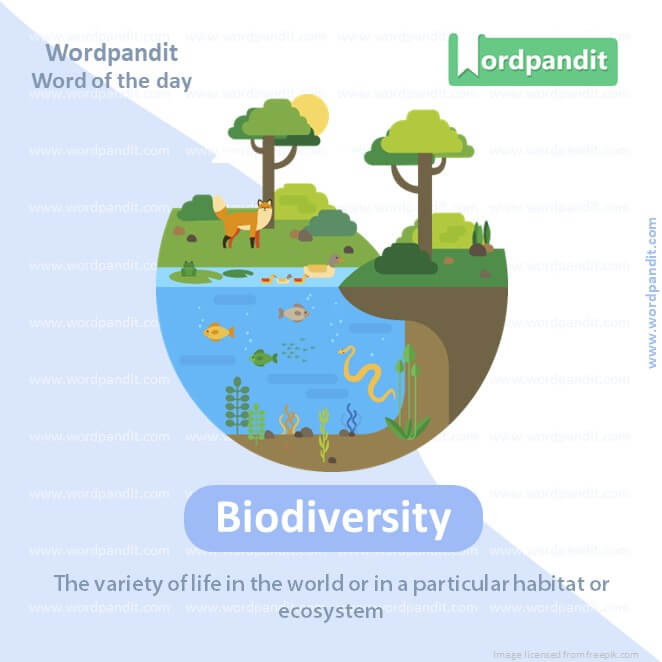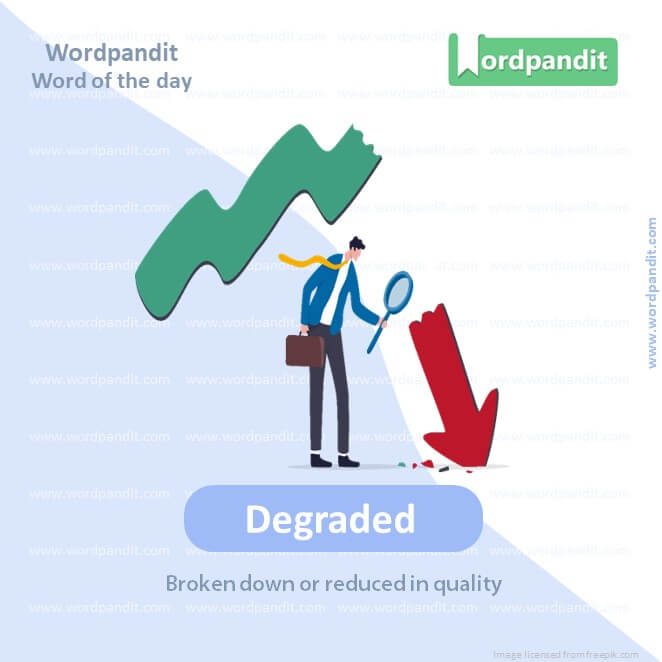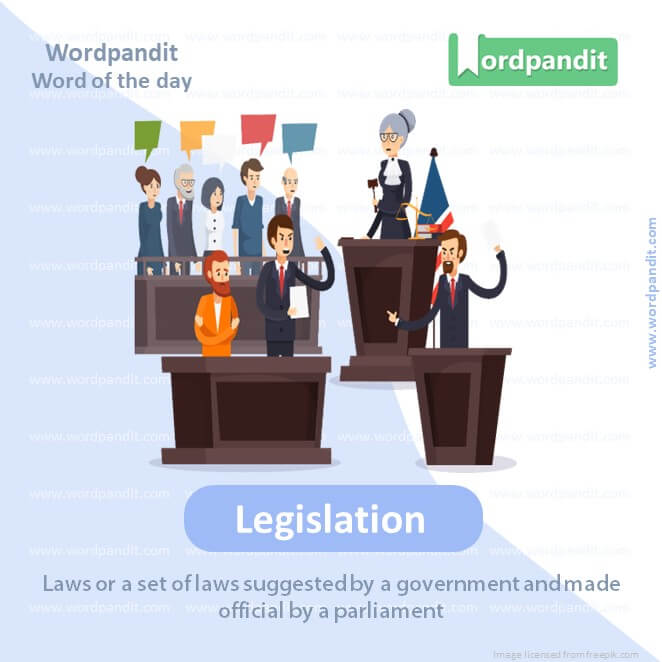Daily Vocabulary Words: List of Daily Used Words in Leading Indian Newspapers
Hi there. Welcome to this special section @ Wordpandit. Our endeavour here is straightforward: highlighting daily vocabulary words that you would come across in leading newspapers in the country. We have included the following newspapers in our selection:
• The Times of India
• The Economic Times
• Hindustan Times
• Mint
• Indian Express
We are putting in extensive work to develop your vocabulary. All you have to do is be regular with this section and check out this post daily. This is your repository of commonly used words; essentially, we are posting a list of daily used words. Hence, this has significant practical application as it teaches you words that are commonly used in leading publications mentioned above.
Visit the website daily to learn words from leading Indian newspapers.

WORD-1: Biodiversity
CONTEXT: Biodiversity is facing severe challenges globally due to rampant deforestation and urbanisation. India, known for its rich flora and fauna, has been a key player in creating measures to mitigate the risks, highlighting the importance of holding unto the natural biodiversity of the regions.
SOURCE: The Times of India
EXPLANATORY PARAGRAPH: Imagine a toy box filled with different kinds of toys: teddy bears, cars, dolls, and robots. Biodiversity is like that toy box, but for our planet. It means our Earth has many different kinds of plants, animals, and tiny creatures. Just like having many toys makes playtime fun, having lots of different living things makes Earth a special and healthy place.
MEANING: The variety of life in the world or in a particular habitat or ecosystem (noun).
PRONUNCIATION: bye-o-dye-ver-si-tee
SYNONYMS: Variety, richness, diversity, multiplicity, heterogeneity.
USAGE EXAMPLES:
1. The rainforest is known for its rich biodiversity.
2. Protecting biodiversity is crucial for our planet’s health.
3. Many scientists study the biodiversity of oceans.
4. Urban development can sometimes threaten local biodiversity.

WORD-2: Degraded
CONTEXT: Degraded lands are increasingly enveloping the scenic beauty of Himachal Pradesh. Years of unregulated agricultural activities and illegal mining have been primarily responsible for the degradation.
SOURCE: Hindustan Times
EXPLANATORY PARAGRAPH: Imagine your favorite toy getting old and not working as well. When something is “degraded,” it means it’s not as good or healthy as it once was. Like a playground slide with chipped paint and rust.
MEANING: Broken down or reduced in quality (adjective).
PRONUNCIATION: dee-gray-ded
SYNONYMS: Deteriorated, worsened, diminished, ruined, eroded.
USAGE EXAMPLES:
1. The old house looked degraded after years of neglect.
2. Pollution has degraded the quality of the river water.
3. The book’s pages were degraded after being left in the rain.
4. The city park appeared degraded due to lack of maintenance.

WORD-3: Extractive Industries
CONTEXT: India’s extractive industries, largely mining, have been the underbelly of the country’s economic prowess. New corporate regulations are drawing attention to the potential exploitation, both human and environmental, perpetuated by these industries.
SOURCE: Mint
EXPLANATORY PARAGRAPH: Imagine digging in the sandbox to find hidden toys. Extractive industries are like those digging games, but they dig for valuable things like gold, oil, or diamonds from the Earth.
MEANING: Industries like mining, oil, and gas that involve extracting raw materials (noun).
PRONUNCIATION: ex-track-tiv in-duh-streez
SYNONYMS: Mining, drilling, quarrying, logging, petroleum.
USAGE EXAMPLES:
1. Extractive industries often have a significant impact on the environment.
2. Coal mining is one of the extractive industries.
3. The government is trying to regulate extractive industries to protect nature.
4. Many countries depend on extractive industries for their income.

WORD-4: Legislation
CONTEXT: Government is planning a new legislation aimed at incentivizing businesses to adopt sustainable practices. This comes as part of the broader initiative to achieve India’s commitment towards reducing its carbon footprint.
SOURCE: The Economic Times
EXPLANATORY PARAGRAPH: You know how there are rules at home or school? Like, “don’t run in the hallway” or “clean up after playing”? Legislation is like those rules, but for everyone in a city, state, or country. It’s made by grown-ups called lawmakers.
MEANING: Laws or a set of laws suggested by a government and made official by a parliament (noun).
PRONUNCIATION: lej-is-lay-shun
SYNONYMS: Law, statute, act, ordinance, decree.
USAGE EXAMPLES:
1. New legislation was passed to protect the environment.
2. The legislation regarding seat belts has saved many lives.
3. Lawmakers are working on legislation to help the homeless.
4. Controversial legislation often takes longer to pass.

WORD-5: Thrive
CONTEXT: Despite the current economic slowdown induced by the world pandemic, the IT sector in India continues to thrive, with companies reporting soaring profits and productivity thanks to a now-established culture of work from home.
SOURCE: Indian Express
EXPLANATORY PARAGRAPH: Imagine a plant growing big and strong in the sunlight. When we say something “thrives,” it means it’s doing really, really well. Like when you learn a lot and have fun at school, you’re thriving!
MEANING: To grow, develop, or be successful (verb).
PRONUNCIATION: th-ryve
SYNONYMS: Flourish, prosper, succeed, bloom, burgeon.
USAGE EXAMPLES:
1. Flowers thrive in the springtime sunshine.
2. With proper care, pets will thrive and be happy.
3. Small businesses can thrive in a supportive community.
4. She always seemed to thrive in challenging situations.
WORD-6: Pathogens
CONTEXT: With the recent outbreak of a new variant of the COVID-19 virus, the threat of pathogens is stark. Indian scientists are working relentlessly to understand these invisible killers in a race against time.
SOURCE: The Times of India
EXPLANATORY PARAGRAPH: Pathogens are tiny, sneaky little germs that can make us sick if they get into our bodies. It’s why we wash our hands and try to stay clean, so these germs can’t bother us!
MEANING: Tiny organisms, often viruses or bacteria, that can cause disease (noun).
PRONUNCIATION: puh-tho-gens
SYNONYMS: Germs, viruses, bacteria, microbes, infectious agents.
USAGE EXAMPLES:
1. Washing your hands removes many harmful pathogens.
2. Some pathogens can be spread through the air.
3. Vaccines help protect us from certain pathogens.
4. Water treatment processes remove pathogens to make it safe to drink.
WORD-7: Disenchantment
CONTEXT: There’s a growing disenchantment among millennials in India towards traditional 9 to 5 jobs. Many are opting for freelancing and independent business ventures as alternate career paths.
SOURCE: Indian Express
EXPLANATORY PARAGRAPH: Have you ever felt really excited about a toy, but then, after some time, you weren’t that excited anymore? Disenchantment is that feeling of not being excited or happy about something anymore.
MEANING: A feeling of disappointment or loss of excitement and interest (noun).
PRONUNCIATION: dis-en-chan-muhnt
SYNONYMS: Disillusionment, disappointment, dissatisfaction, letdown, cynicism.
USAGE EXAMPLES:
1. After several failed attempts, he felt a deep disenchantment with the project.
2. The initial excitement of the show led to disenchantment as the plot became predictable.
3. Many felt disenchantment with the new policies.
4. Her disenchantment with the city life grew, and she longed for the countryside.
WORD-8: Frienshoring
CONTEXT: The concept of ‘frienshoring’, wherein firms decide to do business with friendly, usually neighboring countries, is gaining momentum in the Indian textile industry. This practice helps in quicker deliveries, easy compliance, and better communication.
SOURCE: The Economic Times
EXPLANATORY PARAGRAPH: Imagine if you had a big school project and instead of doing it all alone, you asked your friend from the next street to help you. Frienshoring is like that, but for businesses. It’s when they get help from friendly nearby places instead of very far away places.
MEANING: The practice of working with nearby or friendly countries for business tasks, rather than faraway places (noun).
PRONUNCIATION: frend-shor-ing
SYNONYMS: Nearshoring, collaborating, partnering, allying, cooperating.
USAGE EXAMPLES:
1. Many companies are considering frienshoring to reduce costs.
2. Frienshoring can help improve communication between teams.
3. With the challenges in global transportation, frienshoring has become more popular.
4. They decided on frienshoring to keep production closer to home.
WORD-9: Dystopian
CONTEXT: Critics are worried that unchecked advances in AI and data collection could lead to a dystopian future where privacy is non-existent. This topic is being increasingly discussed among Indian tech ethicists.
SOURCE: Mint
EXPLANATORY PARAGRAPH: Imagine a story where everything seems opposite to a happy fairy tale. Instead of castles and rainbows, there might be broken cities and sad people. “Dystopian” is a word that describes such stories or places where things aren’t going well at all.
MEANING: Relating to a society where things are very bad and people are unhappy (adjective).
PRONUNCIATION: dis-toe-pee-an
SYNONYMS: Apocalyptic, bleak, grim, nightmarish, totalitarian.
USAGE EXAMPLES:
1. The movie presented a dystopian future where technology controls everything.
2. Many dystopian novels have gained popularity in recent years.
3. The scene looked like something out of a dystopian novel.
4. In the dystopian world of the story, nature had reclaimed the cities.
WORD-10: Chequered
CONTEXT: India’s foreign policy has had a chequered history. Balancing the needs of a growing economy with maintaining relations with both superpowers and neighboring countries has always been a tightrope walk.
SOURCE: The Economic Times
EXPLANATORY PARAGRAPH: Imagine a board game with squares of two colors, like in a checkerboard or a chessboard. The word “chequered” can describe things like that board. But sometimes, people use it to talk about a past that has had both good and bad times.
MEANING: Having a pattern of squares, or having a varied past with both successes and failures (adjective).
PRONUNCIATION: chek-erd
SYNONYMS: Patterned, squared, varied, mixed, uneven.
USAGE EXAMPLES:
1. The race car had a chequered flag design on it.
2. His chequered past made people unsure about trusting him.
3. The tablecloth had a chequered pattern.
4. Despite her chequered history, she managed to build a successful company.
Vocabulary Pronunciation
The dance of language learning comprises two inseparable partners: vocabulary and pronunciation. The rhythm of this dance is best enjoyed when both partners are in sync. Essentially, mastering ‘vocabulary pronunciation’ is key to expressing and understanding a language effectively. However, what is the ideal approach to learn ‘vocabulary pronunciation’?
Firstly, the process of learning ‘vocabulary pronunciation’ isn’t a sprint. Rather, it’s a marathon where consistency is vital. A gradual and steady pace of learning new words and their pronunciation offers enough time to effectively practice and commit them to memory.
Secondly, to master ‘vocabulary pronunciation’, go beyond written text. Dwell in the world of audible language, such as documentaries, podcasts, music, or language-learning apps that provide pronunciation guides. These memorable auditory experiences aid in refining your ‘vocabulary pronunciation’ and offer a glimpse into the authentic sounds of the language.
Another beneficial strategy for learning ‘vocabulary pronunciation’ involves the use of phonetic transcriptions. They offer systematic approaches to understanding the sound system of a language, thereby improving pronunciation.
Most importantly, do not shy away from practicing your ‘vocabulary pronunciation’. Be it in a language exchange meeting, a conversation with a native speaker, or even a self-recording session, active verbalization massively boosts your pronunciation prowess.
Lastly, always remember to train your ears as much as you train your tongue. Listening carefully to native speakers helps you capture the subtleties of ‘vocabulary pronunciation’, contributing to better delivery when you speak.
In conclusion, mastering ‘vocabulary pronunciation’ is not an overnight journey. It’s a process of intentional practice, sustained listening, conscientious reflection and active usage. As you chart this course with diligence and patience, you will witness your ‘vocabulary pronunciation’ skills blossom, leading you to communicate with greater fluency and confidence.









